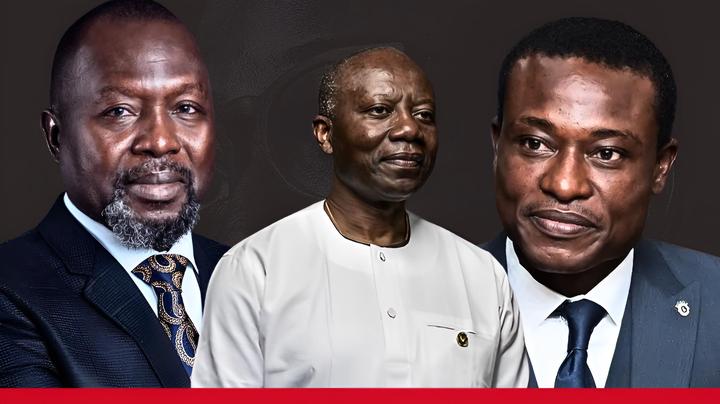Kay Cudjoe writes:
The tension between the Office of the Special Prosecutor (OSP) and the Attorney General’s Department is not just an administrative disagreement; it is a reflection of a Republic struggling to trust its own justice system.
Before their appointments, the Special Prosecutor and the Attorney General once worked together in the same law firm. They shared a vision of justice, but like many partnerships built on principle, it ended in divergence. One went on to serve power, the other to question it. Today, fate has placed them on opposite sides of the same national story, bound by law but separated by perception.
The OSP, created under Act 959, is meant to stand tall and alone. The law protects it from the control of any authority, even the Attorney General. Its mission is narrow but profound: to trace corruption, to prosecute it, and to prove that no one stands above accountability. The Attorney General, on the other hand, is the government’s legal pillar and public prosecutor, with the constitutional duty to defend the State. One stands beside power, the other stands between it and the people.
In principle, they were never meant to be enemies. Their roles were designed to complement each other, to make justice both powerful and fair. But in a country where everything becomes political, independence is often mistaken for defiance and oversight mistaken for disloyalty.
That misunderstanding has now come alive in the case of former Finance Minister Ken Ofori Atta. The Attorney General’s office says it has written several letters to the OSP asking for the docket to trigger extradition from the United States but claims no response came.
[The OSP maintains that it began the extradition process for Ken Ofori Atta on 2 June 2025 through the Chief of Staff, who forwarded the request to the Attorney General the next day as the Central Authority under Ghana’s Mutual Legal Assistance framework. The Attorney General acknowledged receipt on 13 June 2025, requested two OSP officers for the prosecution team, and asked for a copy of the docket. The OSP replied on 20 June 2025, naming its officers and noting that the docket was being finalised following a joint search and seizure operation with National Security at SML offices.]
Both sides claim the law, the public hears only confusion.
When truth becomes unclear, citizens lose faith. That is why a joint press conference would serve not political optics but the Republic itself. Ghanaians deserve one truth, one voice, one version of events from the people who swore to uphold the law in their name.
The recent leak of official correspondence between these two institutions has made matters worse. It does not just embarrass government; it weakens Ghana’s credibility. Every leaked document becomes ammunition for Ofori Atta, who has already argued in American courts that the case against him is politically motivated. Each leak strengthens that narrative and slows the process of justice. The independence of the OSP was the very reason the United States trusted Ghana’s request in the first place. Because the OSP was created and appointed under a previous administration, it carried no political colour. But every careless disclosure now stains that credibility.
Musah Dankwa, a respected auditor, asked a question that deserves reflection. If the OSP is independent, what does handing over the docket really mean? Can the OSP still share facts and evidence with the Attorney General without surrendering control? In accounting, there is a principle called substance over form, meaning what matters is not the paperwork but the truth behind it. Perhaps that should apply here. What Ghana needs is cooperation, not control.
In stronger democracies, the Attorney General does not personally prosecute. That work is left to independent prosecutors to prevent political interference. Ghana has not reached that point yet, which is why the OSP matters. It is our firewall, the one institution meant to stop power from policing itself. If that wall collapses, corruption will no longer need lawyers; it will have laws of its own.
Still, there are those calling for President Mahama to sack the Special Prosecutor. Such calls are neither legal nor wise. The law provides a clear process for removing an independent officer: a formal petition, a review, and the recommendation of a committee. The President cannot simply wake up and dismiss the OSP. We have seen what happens when leaders interfere with constitutional offices. The controversial removals of former Chief Justice Gertrude Torkornoo and former Electoral Commissioner Charlotte Osei left scars on public confidence. President Mahama, having campaigned on reform, would not wish to repeat that history.
But beyond personalities lies a bigger moral question. Why is the OSP the centre of public outrage while the Electoral Commission, which has committed far greater constitutional breaches, continues to operate untouched? This is the same Commission that disenfranchised the people of SALL, revoked valid voter ID cards against court orders, declared results before collation was complete, later changed those results without explanation, ignored Parliament’s summons for audit, and rearranged constituency boundaries in violation of Article 47(5). It also supervised questionable voter transfers and by-elections where nonresidents voted unlawfully. These are not clerical mistakes; they are constitutional injuries that have weakened democracy itself. Yet the EC remains protected while the OSP is vilified. Where lies our moral balance?
The Republic does not need rivalries between its guardians. The OSP and the Attorney General must remember that they serve one nation, not two masters. Their loyalty is to justice, not jurisdiction.
Until they stand together, until the law stops fighting itself, the people will keep asking the same question that echoes in every court, every newsroom, and every conscience: Where lies the truth?
Kay Codjoe
P. S. Updated with verified OSP details: the extradition request went through the Chief of Staff to the Attorney General, but the full docket was still being finalised. Thanks to comrades who flagged the earlier error.
